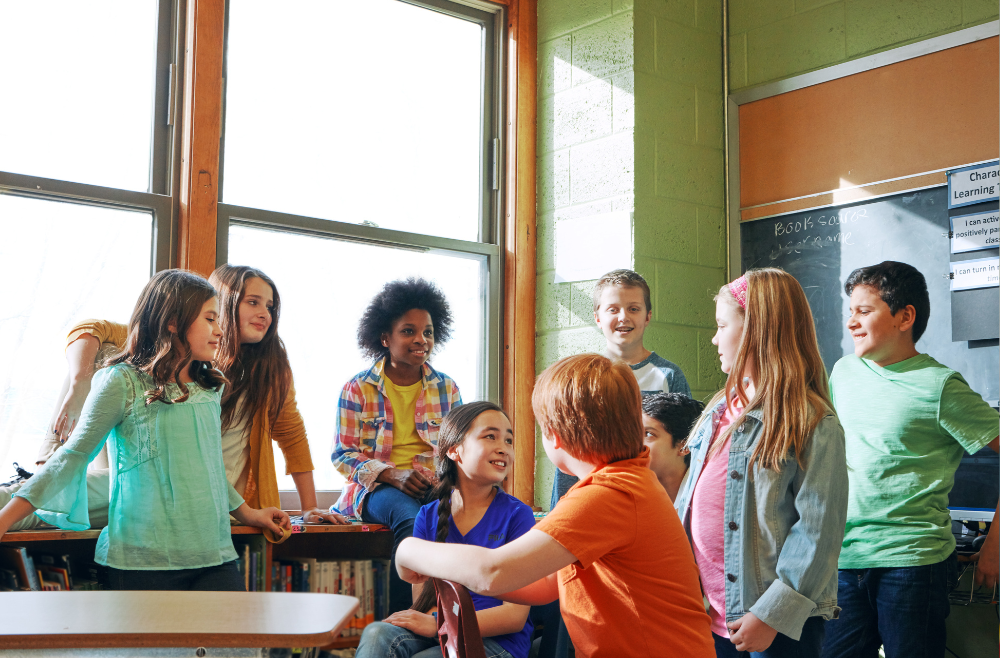Building Lifelong Friendships: How You Can Help Your Child Build Their Social Skills and Make Good Friends

As you watch your child engage in summer activities with friends—whether it’s exploring nature trails, having water balloon fights, building sandcastles at the beach, or crafting art projects—know that their play goes beyond mere fun. These experiences are helping bolster your child’s mental well-being, build lasting trust, and create a foundation of security that will benefit them for years to come.
Maybe you worry that your shy child struggles to connect with peers, or perhaps your child is the class clown or chatterbox who has never met a stranger. Whatever your child’s personality, they can build strong, healthy friendships and increase their social-emotional learning with your guidance.
Friendships are the foundation for academic success, self-esteem, and lifelong happiness. Here are some benefits of social success:
Enhanced Academic Performance
Friendships can positively impact a child’s academic performance. When children have friends, they are more likely to enjoy school and feel motivated to participate. Friends can also offer educational support and healthy competition, encouraging better study habits and a more substantial commitment to learning.
Boosted Self-Esteem
Good friendships are a key factor in building a child’s mental well-being. Friends provide a sense of belonging and acceptance, which helps children feel valued and understood. This validation is crucial during the formative years of elementary and middle school, where self-perception is still developing.
Lifelong Success
The social skills children learn through friendships—such as empathy, communication, and conflict resolution—are essential for success in adulthood. These skills help them navigate relationships in their personal and professional lives.
How You Can Help Your Child Make Good Friends:
Model Empathy and Kindness
Empathy begins at home. Lead your family’s interactions with fairness and kindness. Children observe and imitate adult behaviors, so handling conflicts calmly and showing compassion towards others is important.
Encourage Open Communication
Make it a habit to talk about each other’s days, interests, and feelings. Family dinners without the distraction of devices can foster better communication skills. These conversations can teach your child to be curious about others, reflect on how they handled social situations, and express themselves clearly.
Promote Cooperation
Engage in family activities that require teamwork, such as cooking together, playing board games, or doing household chores. These activities are not only fun but teach children the value of working together.
Teach Emotional Regulation
Help your child understand and manage their emotions. When they experience intense feelings, guide them in finding constructive ways to express and cope with those emotions. This skill is crucial in maintaining healthy friendships.
Apologize and Forgive
Teach your child the importance of apologizing when they’ve made a mistake and forgiving others. Understanding accountability and conflict resolution are fundamental to sustaining long-term friendships.
How to Pave the Way for Your Child to Make Social Interactions:
Give Your Child Opportunities to Engage in Group Activities
Encourage your child to join sports teams, clubs, or other activities that match their interests. These settings provide natural opportunities for making friends with shared interests.
Help Your Child Organize Social Gatherings
If you have an elementary-aged child, you may want to get to know other parents and arrange outings like a local park cookout or bowling game that includes your child’s peers and their families. These relaxed environments can help children bond without the pressure of one-on-. one interactions.
If your child is older, ask them what they’d like to do with a friend or friend group. Based on their interests and the number of friends who will participate, you can brainstorm great ideas! Your child’s buy-in will motivate them to plan an activity with your support.
Balance Support and Independence
While it’s essential to allow your child to navigate social interactions independently, there are times when your intervention may be necessary. If children are not engaging with each other, you can suggest activities to facilitate interaction. Similarly, step in if there is any sign of bullying or meanness.
Let’s Work Together to Nurture Friendships for a Brighter Future.
Helping your child make good friends is vital to their journey toward academic excellence, robust self-esteem, and overall life success. At Best in Class Education Center, we understand the importance of holistic development. Our programs are designed to enhance academic skills and foster social growth in a supportive and nurturing environment.

